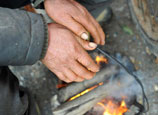
BEIJING - The Communist Party of China (CPC) has sought to mobilize the public to engage in a stepped-up anti-corruption campaign.
A spokesman for the CPC Central Commission for Discipline Inspection (CCDI) said at a Wednesday press conference that the public is welcome to report violations of discipline and law by CPC officials.
Spokesman Cui Shaopeng said people will receive prompt replies if they use their real names when offering tips, which can be provided online or through a national hotline.
Whistleblowers largely favored sending letters and making in-person visits when offering tips last year, leading to official investigations for more than 40 percent of cases that were handled last year, statistics showed.
A prominent feature of the CCDI's work in 2012 was to broaden channels for the public to supervise CPC officials, according to Cui.
Disciplinary and investigative authorities have been closely monitoring the media and Internet for clues to aid them in their work, Cui said.
The Internet has become a popular platform for citizens to expose corruption in recent years. Netizens have used the Internet to seek out and disseminate incriminating information, leading to the sacking of several officials, including a district head in southwest China's Chongqing municipality.
"People report graft cases on the Internet because they can get more attention there and accordingly create more pressure for officials and anti-corruption bodies," said He Zengke, a development strategist at the Central Compilation and Translation Bureau.
The CPC has attempted to make greater efforts to address corruption and improve transparency following the election of Xi Jinping as general secretary of the CPC Central Committee in November 2012.
Xi said in a speech delivered after the election that the CPC must solve problems related to corruption, bureaucracy and what he referred to as "being divorced from the people."
Members of the CPC Central Committee Political Bureau called for an intense crackdown on corruption at a meeting held on the eve of the new year.
Although tips from the public have been efficient and effective in fighting corruption, they can also be incorrect and misleading at times, experts have warned.
Zhang Youde, head of the social management school at the Shanghai University of Political Science and Law, said legislation should be put in place to rein in the negative effects resulting from online anti-corruption efforts.
















 A web user recently posted a photo of a twisted building in the suburb of Beijing, calling it “Tower of Large Intestine”.
A web user recently posted a photo of a twisted building in the suburb of Beijing, calling it “Tower of Large Intestine”.


![]()
